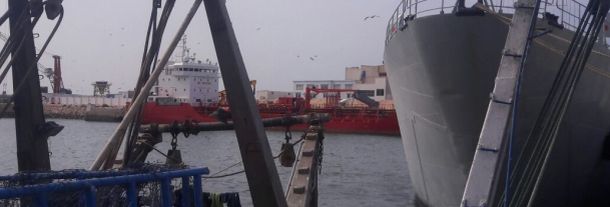WSRW demands end to Scandinavian fish oil imports
Swedish national TV revealed this week how fish oil from occupied Western Sahara is secretly sold on the Scandinavian market. Western Sahara Resource Watch and former German MEP Margot Kessler today sent a letter to the German firm Cognis, asking that they instruct their Norwegian subsidiary to halt the unethical imports.
Published 12 March 2010
Letter below was sent to Cognis on 11 March 2010.
Cognis GmbH
Att: CEO Antonio Trius
Concerning: Open letter on subsidiaries’ imports from occupied Western Sahara
Dear Mr. Trius
We wish to express to you our deep concern over one of your subsidiaries’ imports of fish oil from occupied Western Sahara.
The imports were revealed in Swedish Broadcasting Corporation yesterday. The documentary film shows how Norwegian firm Napro Pharma imports from the occupied territory, while refusing to disclose the origin of the fish oil vis-à-vis its clients. The television production is accessible via www.svt.se/granskning.
Allow us to present why we believe such trade is highly unethical, and should be avoided by your subsidiary in Norway.
Morocco is an illegal occupying power in Western Sahara. The International court of Justice in 1975 established that Morocco has no legal claim to Western Sahara. The Saharawi population remaining in areas under Moroccan occupation is subjected to grave human rights violations, such as torture, forced disappearances and arbitrary detention. Most importantly, however, they have not been allowed to freely exercise their right to self- determination through a free, fair and transparent referendum. This right was established through UN General Assembly resolution 1514 (XV) (1960), and has since been supported by more than 100 UN resolutions. The Government of Germany is a strong supporter of the Sahrawi people’s right to self-determination.
The Saharawi people’s right to self-determination includes, inter alia, the right of permanent sovereignty over its natural resources. Permanent sovereignty over natural resources is a customary principle of international law. Numerous resolutions of The United Nations Security Council and General Assembly and a legal opinion by the former UN Under-Secretary General of Legal Affairs, Mr. Hans Corell on 29 January 2002 affirm this position (www.arso.org/Olaeng.pdf). As the Saharawi have not been able to exercise their right to self-determination, and since they therefore have not been properly consulted, trade with Morocco of natural resources emanating from Western Sahara is a violation of the Saharawi’s right to permanent sovereignty over their resources.
In addition to the legal issues, the political and ethical implications are of serious concern. The Norwegian government has stated such activity a “particularly serious violation of fundamental ethical norms e.g. because it may strengthen Morocco’s sovereignty claims and thus contribute to undermining the UN peace process”. The Norwegian government urges hence its firms to not get involved in natural resource activities in Western Sahara, nor to trade with products from the territory: http://www.regjeringen.no/nb/dep/ud/tema/norgesfremme-og-kultursamarbeid/Norges-omdomme/Bedrifters-samfunnsansvar/Vest-Sahara.html?id=480822
In an article on the webpages of Swedish Broadcasting Corporation yesterday, it is clear that Napro Pharma’s Norwegian product manager has been aware of these controversial aspects of imports from Western Sahara, but the firm has yet continued the imports:
http://svt.se/2.129375/1.1921578/vi_agerade_under_falsk_flagg?lid=puff_1920206&lpos=extra_2
A clear impression is also given that the company has kept from the customers the fact that the fish oil is from Western Sahara.
We sincerely believe it is not of the interest of Cognis to be associated with this trade or with the support to the occupation of the territory of Western Sahara.
We urge Cognis to take this matter seriously, and immediately instruct the Norwegian subsidiary to halt fish oil imports from occupied Western Sahara.
Looking forward to hear from you whether you will take these measures.
Sincerely yours,
Margot Kessler,
Former MEP, Germany
Sara Eyckmans
International Coordinator
Western Sahara Resource Watch
www.wsrw.org
News
Key Bay unloaded all cargo in Fécamp, France
Upon arrival to Ghent, Belgium, tomorrow, the controversial vessel Key Bay - transporting fish oil from Western Sahara into the EU - will be empty.
25 January 2017
A lighter Key Bay is on its way to Ghent, Belgium
The vessel carrying fish oil from occupied Western Sahara into the European Union seems to have unloaded some, but not all, of its cargo in Fécamp, France.
24 January 2017
Here is the Key Bay inside the port of Fécamp
Beautiful images of a vessel with an ugly cargo; fish oil taken illegally from an occupied land; the Key Bay in the port of Fécamp.
24 January 2017
Why the Key Bay imports are not in accordance with EU law
This morning, the Key Bay tanker delivered a shipment of fish oil from occupied Western Sahara to France. But why does that potentially violate EU regulations?
23 January 2017


